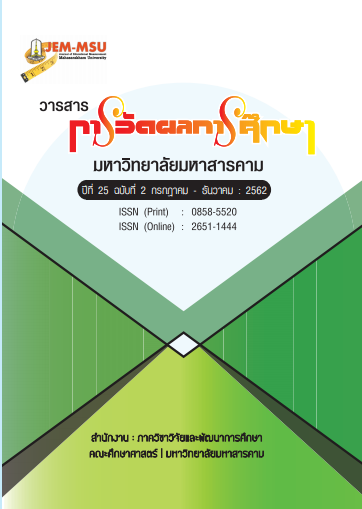Development of Mathematical Problem Solving Ability by Organizing Learning Activities using Polya’s Problem Solving Process for Grade 10 Students
Main Article Content
Abstract
This research aimed to develop the mathematical problem solving ability of grade 10 students by using Polya’s problem solving process. The result was to be compared with the criterion of 60 percent of the total score. The target group consisted of 32 grade 10 students from Group 11 of Sarakhampittayakhom School, Muang District, Mahasarakham Province, Thailand, in the second semester of the academic year 2018, obtained through purposive sampling. The research instruments comprised 1) 8 plans for organizing learning activities on the topic of the Exponent and Exponential Function, basing on Polya’s problems solving process, and 2) a mathematical problem solving ability test which was a subjective type, having 4 questions basing on the steps of Polya’s problem solving process. The statistics employed in the analysis of data were the mean, percentage and standard deviation. The results of this research were as follows: the mathematical problem solving ability of grade 10 students revealed that, after the third operational cycle of learning with Polya’s problems solving process on the topic of the Exponent and Exponential Function, the target group had the average score of 35.06, representing 73.05 percent of the total score. There were 28 students, or 87.50 percent of the target group, whose scores were higher than the 60 percent criterion.
Article Details
The content and information contained in the published article in the Journal of Educational Measurement Mahasarakham University represent the opinions and responsibilities of the authors directly. The editorial board of the journal is not necessarily in agreement with or responsible for any of the content.
The articles, data, content, images, etc. that have been published in the Journal of Educational Measurement Mahasarakham University are copyrighted by the journal. If any individual or organization wishes to reproduce or perform any actions involving the entirety or any part of the content, they must obtain written permission from the Journal of Educational Measurement Mahasarakham University.
References
ควรคิด ชูรัตน์, สุชีรา มะหิเมือง. (2560). การพัฒนาความสามารถในการแก้โจทย์ปัญหาทางคณิตศาสตร์ของนักเรียนชั้นประถมศึกษาปีที่ 2 โดยวิธีสอนแบบบูรณาการการสอนแบบโพลยาร่วมกับเทคนิคเพื่อนคู่คิด. รายงานการประชุมวิชาการและนำเสนอผลการวิจัยระดับชาติและ นานาชาติกลุ่มระดับชาติด้านการ ศึกษา, 1(1), 332-345.
ณัฐพร นวนสาย. (2559). การพัฒนาทักษะกระบวนการแก้ปัญหาทางคณิตศาสตร์โดยใช้กระบวนการแก้ปัญหา ของโพลยาสำหรับนักเรียนชั้นมัธยมศึกษาปีที่ 3. มหาวิทยาลัยราชภัฏบุรีรัมย์.
ธัญญา แนวดง, คงรัฐ นวลแปง, คมสัน ตรีไพบูลย์. (2561). ผลการจัดการเรียนรู้แบบอุปนัยร่วมกับเทคนิค Think-Pair-Share ที่มีต่อมโนทัศน์และความสามารถในการให้เหตุผลทางคณิตศาสตร์. Journal of Humanities and Social Sciences Surin Rajabhat University, 20(1), 29-41.
นิตยา ศรีดารา. (2557). การพัฒนากิจกรรมการเรียนรู้คณิตศาสตร์โดยใช้รูปแบบซิปปา (CIPPA Model) ที่เน้นกระบวนการแก้ปัญหาของโพลยา เรื่อง อสมการ ชั้นมัธยมศึกษาปีที่ 3. วิทยานิพนธ์ศึกษา ศาสตรมหาบัณฑิต สาขาวิชาหลักสูตรและการสอน บัณฑิตวิทยาลัย มหาวิทยาลัยขอนแก่น.
ปรีชา เนาว์เย็นผล. (2537). หน่วยที่ 12 การแก้ปัญหาคณิตศาสตร์. ประมวลสาระชุดวิชาสารัตถะและวิทยวิธี ทางคณิตศาสตร์หน่วยที่ 12-15. กรุงเทพฯ: มหาวิทยาลัยสุโขทัยธรรมาธิราช.
ภิญญดา กลับแก้ว. (2556). การศึกษาผลสัมฤทธิ์ทางการเรียนวิชาคณิตศาสตร์และความสามารถในการ แก้ปัญหาทางคณิตศาสตร์ ของนักเรียนชั้นมัธยมศึกษาปีที่ 2 เรื่อง สมการกำลังสองตัวแปรเดียว โดย ใช้รูปแบบ SSCS โรงเรียน มอ.วิทยานุสรณ์ จังหวัดสงขลา. วิทยานิพนธ์ศึกษาศาสตร มหาบัณฑิต สาขาวิชาการสอนคณิตศาสตร์ บัณฑิตวิทยาลัยมหาวิทยาลัยเกษตรศาสตร์.
รัชชนนท์ แกะมา. (2557). ปฏิรูปตนเองในศตวรรษที่ 21. วารสารวิชาการ ปขมท. 3(3), 1.
วรางคณา สำอางค์, พรชัย ทองเจือ, & ผ่องลักษม์ จิตต์การุญ. (2560). การพัฒนาความสามารถในการแก้ โจทย์ปัญหาคณิตศาสตร์ของนักเรียนชั้นประถมศึกษาปีที่ 6 โดยการจัดการเรียนรู้ตามแนวคิดของ โพลยา. Humanities and Social Sciences Journal of Graduate School, Pibulsongkram Rajabhat University, 11(1), 52-61.
สิริพร ทิพย์คง. 2545. หลักสูตรและการสอนคณิตศาสตร์. กรุงเทพฯ : บริษัทพัฒนาคุณภาพวิชาการ (พว.) จำกัด.
__________. (2559). การอภิปรายในการจัดการเรียนรู้วิชาคณิตศาสตร์. วารสารคณิตศาสตร์. 61(689):
1-15
สมบัติ การจนารักษ์พงศ์. (2547). 29 เทคนิคการจัดกิจกรรมการเรียนรู่ที่หลากหลาย: การเรียนแบบร่วมมือ กรุงเทพฯ: สำนักพิมพ์ธารอักษร.
อัมพร ม้าคนอง. (2554). ทักษะและกระบวนการทางคณิตศาสตร์: การพัฒนาเพื่อพัฒนาการ. พิมพ์ครั้งที่ 2. กรุงเทพมหานคร: โรงพิมพ์ แห่งจุฬาลงกรณ์มหาวิทยาลัย.
Polya. (1973). How to Solve it. New Jersey: Princeton University Press.


